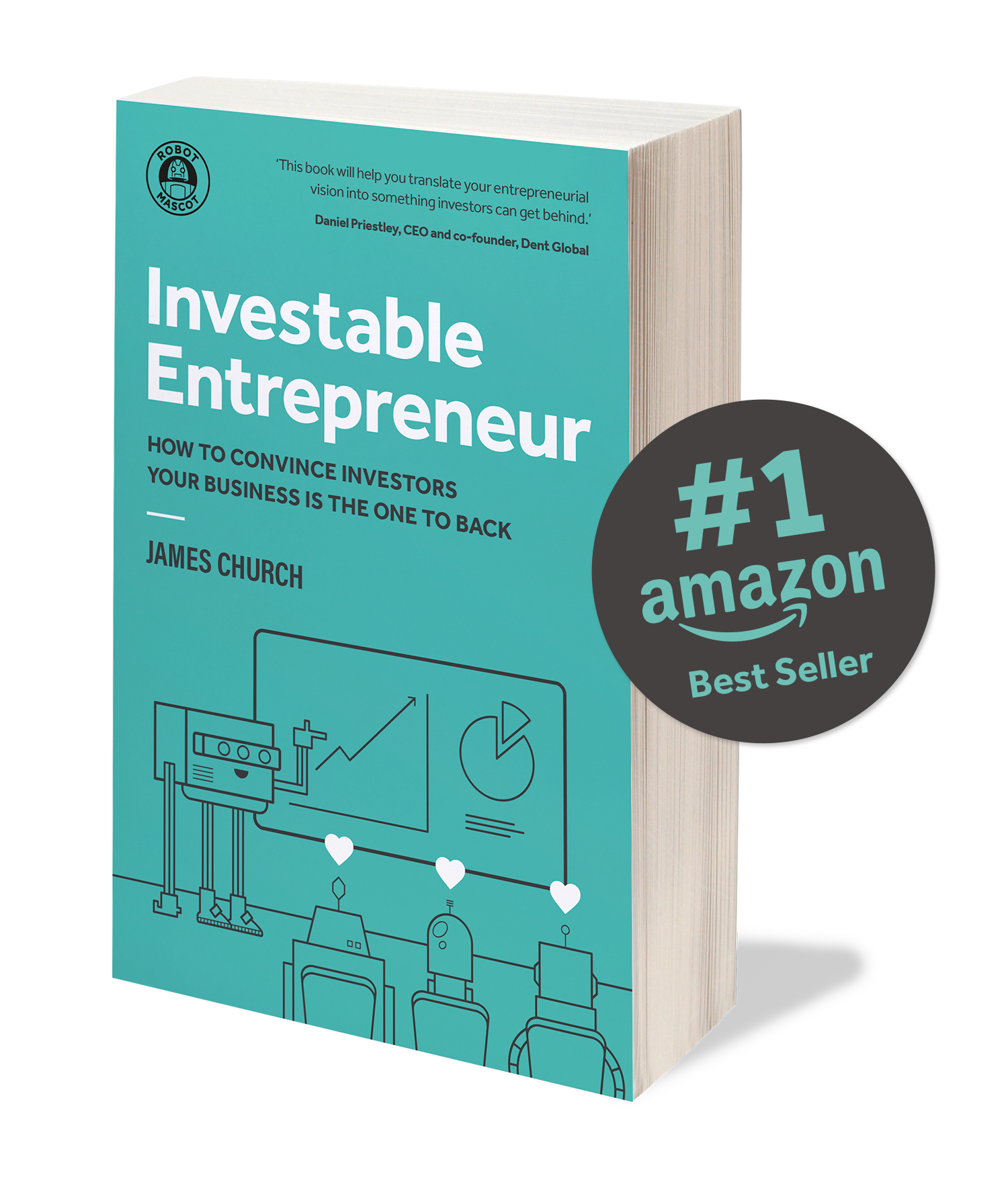

A Complete Guide to Angel Investors for Small Businesses and Startups
16th March 2023
So, you’re looking for investment for your business. You’re aware of angel investing and you’re doing your research into it. If you’re looking for insider knowledge, expert advice and a step-by-step guide to angel investment, then you’re in the right place because we’re experts at helping organisations secure investor funding.
This comprehensive guide to angel investors and angel investing answers the most common questions asked by those seeking investment. It also addresses all of the important aspects of angel investing that businesses need to know to prepare themselves for investment. It will help guide you in getting your business ready for investment.
Jump to the following sections:
- What is angel investing?
- What is an angel investor?
- Who uses angel investors?
- Angel investing vs venture capital
- What angel investors provide
- What angel investors look for in a business
- Business stage
- Sectors
- What angel investors want in return
- Finding an angel investor
- Securing angel investor funding
- Stages angel investment
- Pros and cons
- Pitfalls
- Examples of companies that had angel investment
- Angel investor checklist for entrepreneurs
What is angel investing? In a nutshell
Angel investing refers to the practice of investing money in start-up companies in exchange for equity ownership. Angel investors are typically wealthy individuals who provide funding to early-stage companies in exchange for a percentage of ownership in the company. They may also provide mentorship and other forms of support to the companies they invest in. Angel investing can be a high-risk, high-reward endeavour, as many start-ups fail, but successful investments can yield substantial returns.
What is an angel investor?
An angel investor is an individual who provides financial backing for early-stage startups or entrepreneurs, typically in exchange for ownership equity or convertible debt. Angel investors typically have high net worth and may provide not only funding but also mentorship and industry connections.
Who uses angel investors?
Angel investors are typically used by early-stage startups or entrepreneurs who are in need of seed capital to get their business off the ground – or to support early growth.
Businesses like this don’t always have access to traditional sources of funding, such as bank loans or venture capital, and often turn to angel investors for support.
Not all startups and entrepreneurs need angel investors. Some businesses may be able to bootstrap, or self-fund their growth. Some may have other alternatives for funding such as crowdfunding or venture capital.
What’s the difference between angel investing and venture capital?
Angel investing and venture capital investing are both forms of private equity investment, but they differ in a few key ways.
- Angel investing typically refers to high-net-worth individuals who invest their own money in early-stage companies. These investors often provide not just capital, but also mentorship and industry connections to the companies they invest in. Angel investments are typically smaller, with individual investments typically ranging from £20,000 to £100,000.
- Venture capital, on the other hand, refers to institutional investors who invest other people’s money, such as pension funds or endowments, in early-stage companies. These investors also provide mentorship and industry connections but tend to invest larger amounts of money, typically ranging from £1 million to £10 million or more.
Angel investing is usually early stage, high risk and low investment, while venture capital is later stage, high-risk and high-investment.
What do angel investors provide?
Angel investors typically provide funding to early-stage startups or entrepreneurs in exchange for ownership equity or convertible debt. The income for the angel investor comes from the return on their investment, which can come in the form of capital appreciation (increase in value of their ownership stake) or dividends (a share of the company’s profits) if the company becomes profitable. If the company is successful and eventually goes public or is acquired by another company, the angel investor’s stake in the company will be worth much more than the original investment and they can realise substantial returns on their investment.
What are angel investors looking for in a business?
An angel investor will be looking for a variety of things when considering whether to invest in a business. Key factors they consider include:
1. The team
Angel investors want to see a strong and dedicated team in place, with the necessary skills and experience to execute the company’s business plan.
2. Market opportunity
The investor wants to invest in a business that has a large and growing target market, with a clear and proven customer demand.
3. Competitive advantage
The business should have a unique product or service offering that differentiates it from competitors and gives it a competitive advantage.
4. Traction
The business should ideally have some form of traction, such as users, revenue, customers, or partnerships, which demonstrate that the business is on a path to success.
5. Financials
The business should have a sound financial plan in place, including a clear understanding of the costs, revenue, and potential returns on investment.
6. Exit strategy
The investor wants to see a clear path for exiting the investment, such as through an IPO or acquisition by a larger company.
7. Alignment
The investor’s values, interests and goals should align with the company’s vision.
8. Scalability
The business should have the potential to scale up and grow in the future, providing a larger return on investment for the angel investor.
While these are some of the general things that angel investors look for, it is important to note that each investor may have different priorities and focus on different aspects of a business.
At what stage do angel investors invest?
Angel investors typically invest in businesses at an early stage, often referred to as ‘seed’ or ‘startup’ stage. The company is usually in the process of developing its product or service, and may not yet have a proven track record of revenue or customers – it may be pre-revenue or generating minimal revenue. Investment at this stage aims to help the business get off the ground and support early growth.
Some angels only invest in businesses that are already generating revenue, have a product or service in the market and/or have a clear path to profitability.
It is important to note that there are also later-stage angels who invest in more mature companies that have already established a customer base and are generating revenue, but still require additional funding to scale their operations or enter new markets.
What sectors do angel investors invest in?
Angel investors invest in a wide range of sectors, but some of the most common include:
- Technology: software, hardware, internet of things (IoT), blockchain, artificial intelligence, machine learning and other emerging technologies.
- Healthcare: biotechnology, medical devices, pharmaceuticals and healthcare services.
- Consumer products and services: consumer goods and services, retail and e-commerce.
- Business products and services: enterprise software, business services and B2B startups.
- Energy and clean technology: renewable energy, energy efficiency, clean technology and sustainability.
- Agriculture and food: farming, food production and food technology startups.
These are good guides for the general sectors angels invest in, however, many investors have different areas of interest, and/or might focus on specific sub-sectors within these and other areas.
What do angel investors want in return?
In general, angel investors want to see a return on their investment, which can come in the form of capital appreciation (increase in value of their ownership stake) or dividends (a share of the company’s profits) if the company becomes profitable. The ultimate goal for most angel investors is to see their investment grow in value and eventually be sold at a substantial profit.
In return for their investment, angel investors typically want a percentage of ownership (equity) in the business. This percentage will depend on the size of the investment and the valuation of the company at the time of the investment.
In addition to equity, investors may also want to take a seat on the board of directors, which gives them more influence over the company’s direction and decision-making.
Some angels may also accept ‘convertible debt’ in exchange for their investment. Convertible debt is a loan that can be converted into equity at a later date, usually at a discounted price or at a valuation cap, which gives the investors more protection in case the company does not perform well.
As is so often the case with angel investment, each investor will have different expectations and negotiation terms for their investment, so it’s important for you to understand what you’re getting into and what you’re willing to give up in exchange for the investment.
How can I find an angel investor?
There are several ways that businesses can find angel investors to invest in their business:
1. Angel groups and networks
Many cities have angel groups or networks that bring together local angel investors. These groups provide opportunities for startups to pitch their business and connect with potential investors.
2. Online platforms
There are several online platforms such as Wellfound (formerly AngelList), Gust and DeckSender, that connect startups with angel investors. These platforms allow startups to create a profile and pitch their business to a wide range of potential investors.
3. Referrals and networking
You can also find angel investors through your own personal networks and by asking for referrals from other business owners or entrepreneurs who have already raised angel funding.
4. Incubators and accelerators
Incubators and accelerators provide mentorship and resources to startups and often have a network of angel investors they can introduce startups to.
5. Entrepreneurial events
Many entrepreneurial events such as pitch competitions, startup fairs and networking events, also provide opportunities for startups to connect with angel investors.
Finding an angel investor is not an easy task. It takes time and effort, and not all businesses will be successful in raising angel funding.
You should be prepared to pitch your business and be ready to answer questions and provide information about your company and its financials.
What do I have to do to get angel investor funding?
Businesses typically need to go through an in-depth process to successfully secure angel investor funding. Steps can include:
1. Develop a solid business plan
A well-written business plan that clearly outlines the company’s goals, strategies, and financial projections is essential to attract angel investors. See our Business Plan Template
2. Build a strong team
Angel investors want to see that the business has a dedicated and experienced team in place to execute the business plan. This can include advisors.
3. Demonstrate traction or validation
Angel investors want to see that the business has been able to prove that their concept is something the market wants and needs, and that they’re willing to pay for it. Ideally (but not always) they’ve already achieved some level of success, such as users, revenue, customers or partnerships, which demonstrate that the business is on a path to success.
4. Create a compelling pitch
The business should be able to present a clear and compelling pitch that explains the company’s value proposition, market opportunity, and financial projections.
Read: Five Ways To Make Your Pitch Deck Stand Out From The Crowd
5. Be prepared to negotiate
Angel investors often want to negotiate the terms of the investment, such as the percentage of ownership, board seats, and milestones to understand what you feel is and is not on the table.
6. Provide detailed financial projections and have a clear exit strategy
Angel investors want to see a clear financial plan in place and a path to exit the investment, such as through an IPO or acquisition. See our Financial Projection template.
7. Be transparent and honest
Angel investors want to see that the business is trustworthy and transparent, so it’s important to be honest about the company’s strengths and weaknesses and to be willing to answer questions.
Raising angel funding can be time-consuming and may take several months to complete. Entrepreneurs should be prepared to make multiple pitches and follow up with potential investors.
It’s important for you to be persistent, be open to feedback and be willing to make changes to your pitch or business plan to make it more attractive to potential investors.
Read: How To Survive Investor Rejection – 4 Top Tips For Founders
Read: How To Write Compelling Pitch Deck Content That Engages Investors
What are the key stages of securing angel investment?
As mentioned, securing investment can take several months and each stage can take varying amounts of time. The process can also be quite complex, with each investor having different requirements, and it’s important for the business to be prepared and have a clear understanding of what they are getting into. An indicative process might be:
1. Preparation
This includes developing a solid business plan, creating a credible set of financial projections, building a strong team, and identifying potential angel investors.
2. Introduction
This involves reaching out to potential angel investors, either through personal networks, online platforms, or angel groups, to introduce the business and its value proposition.
3. Pitch
The business will typically be required to make a formal pitch to the potential angel investor, usually in the form of a presentation. This is an opportunity for the business to showcase its product or service, market opportunity and financial projections.
4. Due diligence
If the angel investor is interested in the business, they will typically conduct due diligence to verify the information provided in the pitch and to evaluate the business’s potential for success.
5. Negotiations
If the angel investor is satisfied with the results of the due diligence, they will typically negotiate the terms of the investment, such as the percentage of ownership, board seats and milestones.
6. Closing
Once the terms of the investment have been agreed upon, the deal will be closed, and the angel investor will provide the funds to the business.
7. Post-investment
After the investment is made, the angel investor will typically take an active role in the business, providing mentorship, industry connections and support to the business.
What are the pros and cons of working with angel investors?
Pros
1. Capital
Angel investors provide the business with the capital it needs to get started or to grow.
2. Mentorship and experience
Angel investors typically have experience and knowledge in the industry and can provide valuable mentorship and guidance to the business.
Network and connections
Angel investors often have a wide network of contacts and connections that can help the business to grow.
Validation
Securing angel investment can be a validation of the business idea and can help to attract further investment.
Flexibility
Angel investors typically have more flexibility in terms of investment structure and terms than venture capital firms.
Cons
Dilution of ownership
In exchange for the investment, angel investors will typically take a percentage of ownership in the business, which will dilute the ownership of the business.
Loss of control
Angel investors will typically want some level of control and influence over the business’s direction, which can be a loss of autonomy for the business owner.
High-risk investment
Angel investing is a high-risk investment, and many businesses fail to succeed, so angel investors may lose their investment.
Time-consuming
Raising angel investment can be a time-consuming process, and entrepreneurs may need to spend a significant amount of time searching for and pitching to potential investors.
Potential for conflict
Having multiple angel investors involved in the business can lead to conflicts and disagreements over the direction of the business.
It is important to note that each business and situation is unique and what may be considered a pro or a con can vary depending on the specific circumstances, and of course, perspective. You should weigh the pros and cons carefully and have a clear understanding of the potential impact of angel investment on your business before making a decision.
What are the common pitfalls of looking for angel investor finance?
1. Lack of preparation
Not having a well-written business plan, a credible set of financial forecasts, a strong team and a clear value proposition can make it difficult to attract angel investors.
2. Unrealistic expectations
Not having a clear understanding of the time and effort required to raise angel funding and expecting to secure funding too quickly can lead to disappointment.
3. Neglecting to conduct proper due diligence
Not thoroughly researching potential angel investors and their investment history can lead to mismatches and disappointment.
4. Failing to build a strong relationship
Not building a strong relationship with angel investors, and not keeping them informed about the business’s progress can lead to misunderstandings and mistrust.
5. Giving up too much equity
Giving up too much equity in the business too early in the process can dilute the ownership and control of the business, and can make it difficult to raise further funding in the future.
6. Not understanding terms of the investment
Not understanding the terms and conditions of the investment, such as the percentage of ownership, board seats, and milestones, can lead to misunderstandings and disappointment.
7. Not having a clear exit strategy
Not having a clear plan for how the angel investor can exit the investment and realise a return on their investment can make it difficult to secure funding.
Examples of famous companies that had angel investors
The search giant was founded by Larry Page and Sergey Brin, who initially received angel investment from family and friends to help get the business off the ground.
Tesla
Electric car maker Tesla was initially funded by angel investors, including PayPal co-founder Elon Musk, who is now the company’s CEO.
Social media giant Twitter was founded by Jack Dorsey, Biz Stone, and Evan Williams, and initially received angel investment from Odeo co-founder Evan Williams.
Dropbox
Online storage provider Dropbox was founded by Drew Houston and Arash Ferdowsi and was initially funded by angel investors, including Y Combinator.
Uber
The ride-sharing giant was founded by Travis Kalanick and Garret Camp, who initially received angel investment from investors including First Round Capital and Lowercase Capital.
Airbnb
The home-sharing platform was founded by Brian Chesky, Joe Gebbia, and Nathan Blecharczyk, who initially received angel investment from investors including Paul Graham, Ron Conway and Y Combinator.
Snapchat
The social media platform was founded by Evan Spiegel, Bobby Murphy and Reggie Brown, who initially received angel investment from Lightspeed Venture Partners.
Angel investor checklist for entrepreneurs
1. Understand what angel investing is
If you read this article, you’ll be well on your way, though there is much to cover beyond it. Browse our articles and free resources for useful and insightful articles to help you understand exactly what angel investing is and how to secure it.
2. Understand the risks and rewards
Angel investing is high-risk, high-reward. The potential rewards are high, with the possibility of significant returns on investment if the business is successful. However, the risks are also high, with the possibility of the investors losing their entire investment if the business fails. A great founder is all too aware of the risk the investor is taking on their idea.
3. Understand your investors risk tolerance
Before agreeing investment, it is important to understand your potential investors’ risk tolerance, and make sure it matches up with your own.
4. Conduct due diligence
It is essential to conduct thorough due diligence on the investor, including researching their background and experience, and getting references from their portfolio companies.
5. Understand the terms of the investment
You must understand the terms of the investment, including the percentage of ownership, board seats, milestone expectations and limitations placed on your control.
6. Be prepared for the long-term
Getting an angel investor is a long-term commitment, and it can take several years to achieve an exit, so be prepared to have to work with your investors for some time. Making sure your vision is aligned and you each have a strong rapport can be an important part of deciding which investors you want onboard.
We hope you found this guide informative and if you want to find out more about becoming an Investable Entrepreneur, you can download a free copy of our bestselling book Investable Entrepeneur.
Learn how to convince investors
Investable Entrepreneur takes you through our winning methodology – the process we use to increase our client’s chances of raising investment by more than 30x.
“This book will help you translate your entrepreneurial vision into something investors can get behind.”
Daniel Priestley, CEO and founder, Dent Global and four times best-selling business author

Keep up to date with what we’re up to via email






Copyright ©Robot Mascot Ltd. All rights reserved.








